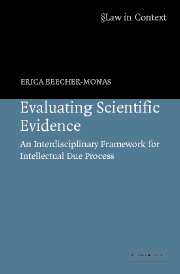Book contents
- Frontmatter
- Contents
- Acknowledgments
- Evaluating Scientific Evidence
- Introduction
- 1 Triers of science
- 2 What is intellectual due process?
- 3 A framework of analysis
- 4 Toxic torts and the causation conundrum
- 5 Criminal identification evidence
- 6 Future dangerousness testimony: The epistemology of prediction
- 7 Barefoot or Daubert? A cognitive perspective on vetting future dangerousness testimony
- 8 Future dangerousness and sexual offenders
- 9 Models of rationality: Evaluating social psychology
- 10 Evaluating battered woman syndrome
- Conclusion
- Index
- The Law in Context Series
6 - Future dangerousness testimony: The epistemology of prediction
Published online by Cambridge University Press: 04 December 2009
- Frontmatter
- Contents
- Acknowledgments
- Evaluating Scientific Evidence
- Introduction
- 1 Triers of science
- 2 What is intellectual due process?
- 3 A framework of analysis
- 4 Toxic torts and the causation conundrum
- 5 Criminal identification evidence
- 6 Future dangerousness testimony: The epistemology of prediction
- 7 Barefoot or Daubert? A cognitive perspective on vetting future dangerousness testimony
- 8 Future dangerousness and sexual offenders
- 9 Models of rationality: Evaluating social psychology
- 10 Evaluating battered woman syndrome
- Conclusion
- Index
- The Law in Context Series
Summary
The struggle over what counts as science is in dire straits when it comes to capital sentencing proceedings, where the judiciary has flung wide the gates to wholly unscientific expert testimony. For a democratic system, where the rule of law is foundational in asserting that the solution to the problems of power and freedom is to make the law apply to everyone and to provide rational criteria for distinguishing legitimate from illegitimate uses of power, this lack of rationality has consequences. Judicial failure to scrutinize expert testimony relating to future dangerousness results in a massive failure of intellectual due process.
As discussed in Chapter 2, evidentiary rules are based on the truth-seeking rationality goal of the rule of law. One consequence of this idea is that the methodologies of the justice system should have truth-generating capacity – a notion of due process. A second consequence is a concern for accurate evidentiary input: in order to reach a justifiable decision, reasoning must be based on trustworthy information. A third consequence of the aspiration to rationality is that even trustworthy facts must have some logical tendency to prove or disprove an issue in the case. This framework for justice is the inspiration for the rules of evidence, and a fundamental tenet is that only facts having relevance – rational probative value – should be admissible in the search for truth.
In one important category of proceedings, however, this framework is tossed to the winds. Sentencing hearings have become an evidentiary free-for-all.
- Type
- Chapter
- Information
- Evaluating Scientific EvidenceAn Interdisciplinary Framework for Intellectual Due Process, pp. 122 - 145Publisher: Cambridge University PressPrint publication year: 2006

